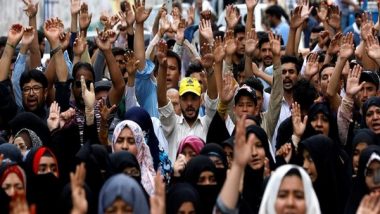
Kharan, Pakistan:
The agitators marched on several roads and chanted slogans later they put forward their demands outside the Kharan Press Club, Dawn reported.
In a statement regarding the abduction, Mengal’s sister told journalists that he had been picked up by plain-clothes armed men on July 18 from his home in Kharan and had been missing since then.
The family demanded that the authorities bring him back at the earliest.
Meanwhile, the sister of Shah Fahad Baloch said he had been missing for more than four months and the family did not know about his whereabouts.
She also demanded his safe recovery and said he should be brought before a court of law if he had done something wrong.
Addressing protesters, Balochistan National Party-Mengal leader Mir Jumma Kubdani expressed his concern about growing incidents of enforced disappearances in Kharan and urged the authorities to stop such unconstitutional and illegal practices.
Atrocities against Baloch are on the rise across Pakistan and several Baloch have been killed in fake encounters and their mutilated bodies often found dumped in remote places, according to several reports.
Recently, nine persons who had been disappeared were killed in fake encounters in Ziarat.
An annual report of the Human Rights Council of Balochistan, which documents human rights violations in the province, said that students are the main target of these kidnappings both in Balochistan as well as in other parts of Pakistan.
Moreover, the cases of kidnapping and enforced disappearances of activists, journalists have become common in Pakistan.
According to the publication, Over 14,00 people went missing in Balochistan and the count is rising every day.
Many victims of enforced disappearance said police refused to name military agencies or personnel in the FIRs. And even if they do, no accused military personnel appear before the courts.
The United Nations too has raised concerns over the lack of a legal instrument that facilitates relatives of the victims to pursue the cases of enforced disappearances due to “fear of reprisals or lack of trust,” according to the publication.
Amnesty International in its report earlier said accountability for enforced disappearances remained elusive in Pakistan.
Enforced disappearances are used as a tool by Pakistani authorities to terrorize people who question the all-powerful army establishment of the country, or seek individual or social rights. Cases of enforced disappearances have been majorly recorded in the Balochistan and the Khyber-Pakhtunkhwa provinces of the country which host active separatist movements






